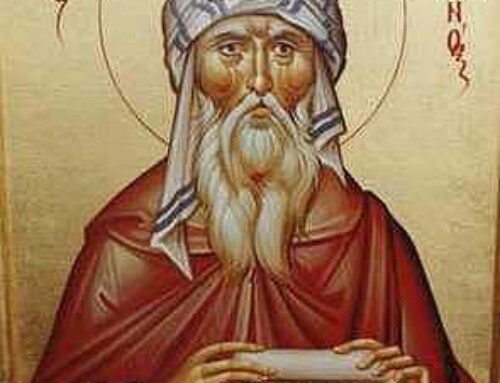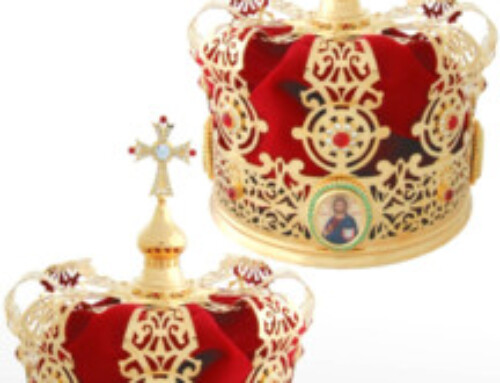Word Magazine October 1958 Page 7
THE RE-INTEGRATION OF THE SACRAMENTS
By Father Michael Azkool
St. George’s, Spring Volley, Illinois
It is important, whenever we speak of the Sacraments, to first discover what is mere “custom” and what is the true character and nature of them. (It is true that the Church recognizes the value of some customs, yet many are discarded, or ought to be discarded, as being uncongenial to Her spirit. Now, the criterion by which She decides what is acceptable to Her and what is not has always been in terms of the idea of worship.
A custom which theologians find most disconcerting and which has been the especial object of their wrath is the separation (disintegration) of the Sacraments from the Liturgy. (The only exceptions are Holy Communion and Ordination). We have, they say disapprovingly, “private weddings”, “private baptisms”, “private Chrismation”, and some object to “private confessions” — a question we shall reserve for another time. They cry, therefore, for the re-integration of the Sacraments” into the “public worship” of the Church — The Divine Liturgy.
~ As an illustration, take the idea of “private marriage”, that is, having the ceremony after the Liturgy, attended not by the Congregation, but by selected guests. What precisely is wrong with this custom becomes apparent when the meaning of Liturgy is understood: it is the supreme act of worship by “the People of God”: by the Church, for the Church, in the Church. The Liturgy is the manifestation of the transforming action of God, changing what is “natural” into what is “supernatural”, and relating all human thought and action to the “Kingdom of God”. It follows that every act of the Church is related to or grows out of the “divine act” of Liturgy.
Historically, the wedding ceremony took place during the Divine Liturgy (as did all of the Sacraments) and the so-called “common cup” was the Holy Communion. Hence, being married meant to be united before the Congregation (the Church) and was the testimony that the couple were members of the Church, that the marriage was approved by the Bishop and the People, that the couple were being married by the Church, in the Church, for the Church, the “Kingdom of Heaven” on earth. It was inconceivable to early Christians that the Sacrament of Matrimony could be performed in any other way.
No Sacrament can be “private”, because the Liturgy is not “private”. All the Sacraments are but expressions or dimensions of the Sacrament of the Eucharist, “the Sacrament of Sacraments”, as the Fathers used to say, and the Liturgy is nothing more than the Eucharist climaxed by Holy Communion. It is for this reason that at every Sacrament, Holy Communion should be given, as it is, for example, at a Baptism. But nowadays, the reception of the Body and Blood are but reminders of what used to be, of where this Sacrament used to take place.
No Sacrament should be “private” because every Sacrament belongs to the “People of God” found in “the Kingdom of God” during the Liturgy, the “Kingdom” wherein the “King” makes His Presence “really” known and whose purpose it is to change, even as the wine and bread are changed into His Flesh and Blood, all His People. For this transformation, He has provided the Liturgy from which His Grace flows into the whole Church and benefits thereby “members in particular”. In other words, God works on the individual by, in, through the Church, and preeminently through the Liturgy.
The Liturgy is fundamentally, therefore, “the act of spiritual unity,” or “integration of the People of God”— “unity” with God and His People. His representative, the Bishop, is “the center of unity” and it was he who originally performed all Sacraments — during the Liturgy. (Now that times are more complex, he gives authority to the priest to share his privilege). The Bishop through the power of the Holy Spirit dispensed the Grace through the “Mysteries of the Kingdom” (Sacraments of the Church) which came with the descent of the Holy Spirit during the Liturgy — Sacraments do not work magically or legally! In a word, if there were never a Liturgy of any kind, there would be no operation of the Sacraments. (Today it is only in the virtue of the Holy Communion given to members during the performance of other Sacraments that any of them are at all valid, and the Holy Communion remains the only link between the Liturgy and the other Sacraments).
Now, if we want a “true worship”, if we truly wish to preserve the purity of the Tradition, then, we must insist that all superfluous customs in our worship be done away with and to plead for a “reintegration of the Sacraments” into the Liturgy. When we have our lives “Liturgy-centered” and practice those virtues of which the Liturgy and Her Sacraments speak, then, will Orthodoxy again be able to boast of the “purity of her worship”.


